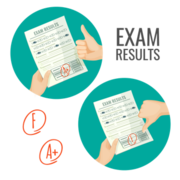
Due to COVID-19, most of the lectures turned to non-face-to-face this year. Chung-Ang University changed the grade evaluation from relative evaluation to absolute evaluation for both semesters of 2020. Starting from the 2nd semester, the university announced that the grade limit for course repetition will also be changed. The change was made because of some students' requests to ease the grade limit for course repetition and consideration of several deans’ opinions. However, many students complained about this on "CAU Community," a community site of Chung-Ang University, or "Everytime," an application for university communities. What made them to be unsatisfied with the notice?
How Did the Course Repetition Grade Limit Change Compared to Before?

Currently, Chung-Ang University students can apply for course repetition if their grades in particular subjects are C+ or under. Students who enrolled by 2017 can get up to an A for course repetition. On the other hand, starting from students who enrolled since 2018, they can only receive up to a B+ for each subject they retake. However, in the 2nd semester of 2020, there was a big change in the limit on the course repetition grades. This semester, all students, regardless of the entrance year, can receive up to an A due to eased regulations on the grade limit of course repetition subjects. By that, students are able to raise their course repetition subjects’ grades 0.5 points more than before. There is a big difference between getting a 3.5 for a particular subject and a 4.0. That’s because getting 0.5 points more in a particular subject has a significant impact on a students’ overall GPA.

Students’ Complaints Regarding the Change in the Grade Limit for Course Repetition
Unfairness in the Notice Content
In the notice, it says that as the grade evaluation for the 2nd semester of 2020 is applied as absolute evaluation, the university will ease the restriction on grade limits for course repetition subjects. That means the reason for changing the grade limit for course repetition is because the grade evaluation is applied as absolute evaluation, not relative evaluation. However, this semester wasn’t the only time to evaluate grades with absolute evaluation. Absolute evaluation was also used in the 1st semester and the summer session. The intent of the university to help students who retake courses get better grades is good. However, it’s unfair to change the grade limit for course repetition only in the 2nd semester of 2020.
What about students who were able to retake courses in the 2nd semester, but retook them in the 1st semester or the summer session instead? If they had known that the grade limit for course repetition was going to be raised to A in the 2nd semester, they wouldn’t have retaken courses when then did. For example, students who retook a common liberal arts course, which opens in both the 1st and 2nd semesters, in the 1st semester, can get a maximum of a B+ according to the existing system. However, other students who retook the same course in the 2nd semester can get up to a maximum A for no reason other than that it’s the 2nd semester. Students who retook major courses that are only available in the 1st semester will also be unhappy with the notice of changing the grades limits for course repetition. This is because they, who are limited in choosing when to take classes, can’t benefit from the changed system. Therefore, the issue of equity is raised on the notice of easing the restriction on the grade limit for course repetition in the 2nd semester.
Late Notice
The notice was posted during the course add/drop period. If a subject that requires course repetition is not popular, students can easily pick it up during the course add/drop period. However, if it is a popular subject, students must apply during the course application period to take the course. If students had received the notice in advance, the students who had to retake courses would have applied for it during that period. The reason is because they can get higher grades for those subjects in this semester compared to other semesters. Giving such important notice during the already late course add/drop period shows the university’s insufficient academic management and isn’t appropriate for students who had courses to retake.

Solutions Which Students Suggested
Students who are unhappy with the notice of changing the grade limit for course repetition posted about it on the "CAU Community" site. This semester, the grade limit for course repetition has been changed due to the reason of evaluating grades with absolute evaluation. Therefore, students asked to apply retroactively the same grade limit for students who retook courses during the 1st semester and summer session. One student also suggested that since the grade limit of course repetition was eased due to absolute evaluation, it should be operated as long as the absolute evaluation progresses.
Some students replied to the writings saying that the last semester’s grades are already transferred so retroactive application is practically impossible since it’ll cause more side effects and damage. However, there were more replies in agreement. There was a reply saying that it’s natural to apply retrospectively, opposing the regulation of grade limit for course repetition which ignored equity. Also, there was a reply saying that not many students retook courses last semester, so retrospective application should be done if a student who retook a specific course got a higher raw score than another student who didn’t retake that course but got an A+. In addition, another student responded by asking for a grade evaluation with Pass/Fail if the previous course repetition subjects can’t be applied retroactively. Many students actively expressed their opinions by coming up with their own ideas on how to respond to unfair situations.

Absolutely, there are students who raise objections to the measure on easing the restriction on the grade limit for course repetition this semester. This is because the university suddenly announced it during the course add/drop period, simpy due to using absolute evaluation. Grades are important for all students. This is because grades are an important factor when preparing for employment and those can prove the results of each student's hard work while attending university. The university's sudden notice shouldn't result in unfair grading, nor should it lead to students expressing anger. Students are wondering what will happen if absolute evaluation continues due to COVID-19. Therefore, Chung-Ang University should provide an appropriate response for students who feel unfairness in the notice of changing the grade limit for course repetition so that no one would get upset about it.

